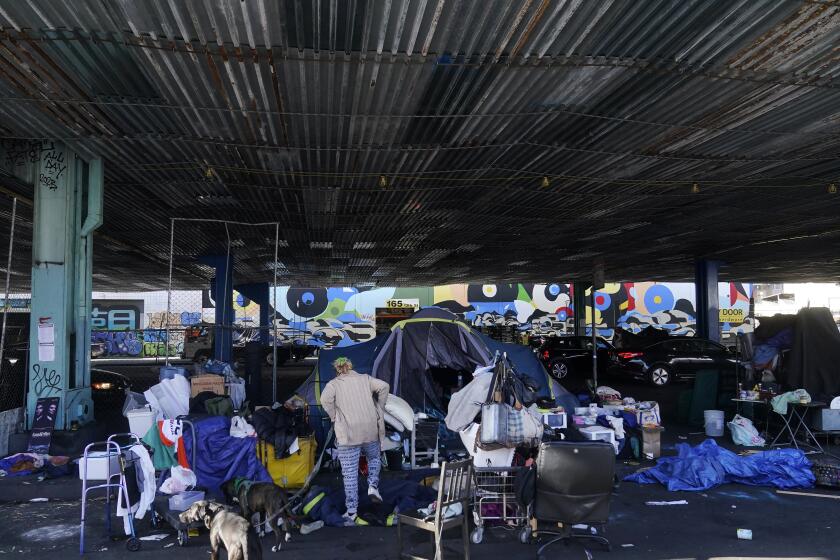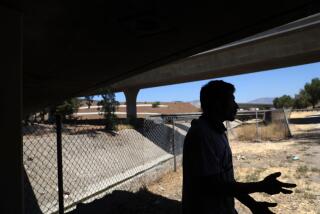Newsom calls for increased oversight of local homelessness efforts

- Share via
SACRAMENTO — Frustrated over the lack of progress on homelessness in California, Gov. Gavin Newsom is calling for increased oversight of cities and counties that receive state funds in an effort to hold them accountable to deliver results.
Newsom’s more aggressive stance is the latest example of the governor wanting local governments to do more to lessen homelessness, which has worsened in his tenure despite more than $20 billion in state funds spent on programs to help over the last five years. He threatened on Thursday to withhold homelessness funds from cities and counties that do not follow through.
“I’m not interested in funding failure any longer,” Newsom said. “I want to see results. Everybody wants to see results.”
The governor’s plan seeks to expand a unit that was created in 2021 within the Department of Housing and Community Development to enforce local compliance with state housing law. The unit’s work has resulted in Atty. Gen. Rob Bonta filing lawsuits against cities, such as Huntington Beach, for refusing to build enough homes.
The proposal would broaden the responsibilities of the Housing Accountability Unit to include oversight of state homelessness grants to cities and counties and whether local governments follow through on their plans to reduce unhoused populations and adhere to state laws. Through the state budget process, the proposal seeks to shift nearly two dozen staff members into the unit to focus on local homelessness oversight and enforcement.
“Local governments have told us that they have plans to reduce unsheltered homelessness,” said Jason Elliott, Newsom’s deputy chief of staff. “They’ve written that down, and they’ve signed on the dotted line. This reform is about making sure that those promises get fulfilled.”
Newsom also wants lawmakers to pass legislation that would, beginning in 2027, in effect require jurisdictions to zone housing for homeless populations and give the state another avenue to hold local governments accountable for reducing homelessness.
The changes “create a pathway for jurisdictions to actually be responsive to that lower income category,” said Tomiquia Moss, secretary of the Business, Consumer Services and Housing Agency. “The zero to 30% area median income, which many of the folks who are unhoused fit within, has not had a housing requirement to it.”
Newsom’s plan is likely to receive support from advocates for the homeless and elicit concerns among some local governments about enforcement. His effort to punish cities and counties for not approving enough housing has drawn a mixed bag of reactions over the years, including concerns about the state infringing on the rights of local government.
The California State Auditor’s Office analyzed homelessness spending at the behest of lawmakers concerned about efficacy.
The effort follows a report from the California state auditor’s office that found the Newsom administration failed to track and evaluate the effectiveness of billions of dollars spent on its own programs. Elliott said the state does not have enough data to determine the efficiency of its homelessness programs and added “we’re really not getting information from local governments about whether or not they’re executing on their obligations.”
Expanding accountability, Elliott said, will hold local governments responsible for delivering solutions and tracking performance in exchange for billions in state funding.
The proposal marks a new effort by Newsom to address homelessness, a pernicious problem in California tied to a shortage of housing, the high cost of living as well as a drug abuse and mental health crisis. At last count, the state’s homeless population stood at 181,000.
Newsom has highlighted homelessness as the top policy priority of his governorship, and in doing so, also made the issue his greatest political vulnerability. Fox News and conservative politicians repeatedly draw on the image of encampments lining California sidewalks as an example of his failures as governor and as a rebuke of Democratic leadership.
The governor is acutely aware of the criticism. At a news conference Thursday to promote state funding to resolve encampments, Newsom said he felt the weight of California’s “478 cities and 58 counties” on homelessness.
While praising some local leaders for making strides in their communities, the governor said others could be penalized if the unit discovers they didn’t properly spend state homelessness funds.
“They sure as hell shouldn’t get another penny if they didn’t use the money wisely,” Newsom said. “So, I want to make sure Tomiquia and her team that are scoring these look at those next applications and say, ‘No, thank you.’ I don’t think that’s even a very complicated response.”
After a close race, Gov. Gavin Newsom’s Proposition 1 overhaul of California’s mental health system narrowly passed in the 2024 primary election.
Newsom has repeatedly criticized local governments for not taking a more aggressive stance to address homelessness and mental health needs in their communities as he takes on progressives in his own party by employing a more moderate approach to the problem than on any other policy issue.
Eager to make progress, the governor successfully advocated for changes to the law to permit compelling people with severe mental illness and substance disorders into care. He recently referred to the narrow passage Proposition 1, his March ballot measure to boost funding and treatment beds for mental health, as an example of voters feeling cynical about the idea that more money would solve the problem.
Newsom said California needs more mayors who “get things done” and “don’t play politics.”
“We mean business in terms of really driving accountability now because this is fundamental [to] the fate and future of this state,” Newsom said. “I care about this state. I care about our reputation. I care that people can’t afford to live here, can’t afford to raise their family here. I care that people visit here and go ‘What the hell’s going on with the encampments?’ and ‘What’s going on in the streets and sidewalks?’”
More to Read
Sign up for Essential California
The most important California stories and recommendations in your inbox every morning.
You may occasionally receive promotional content from the Los Angeles Times.













